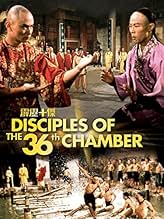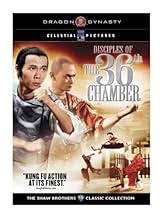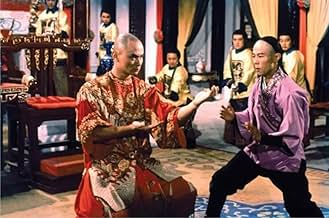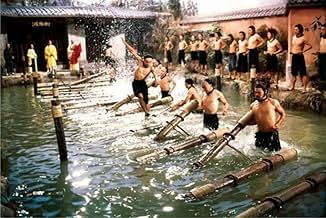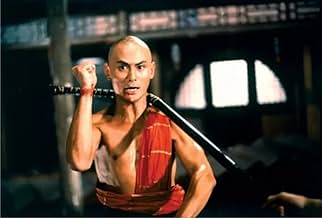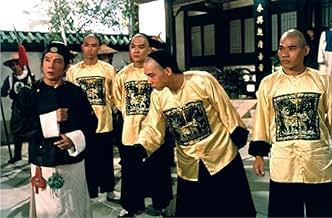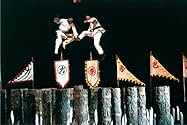AVALIAÇÃO DA IMDb
6,3/10
2,3 mil
SUA AVALIAÇÃO
Adicionar um enredo no seu idiomaGordon Liu Chia-hui reprises his famous Monk San Te role as he tries to support and protect Shaolin her Fang Shih-yu who purposely attacks corrupt Ching officials. Fights by legendary action... Ler tudoGordon Liu Chia-hui reprises his famous Monk San Te role as he tries to support and protect Shaolin her Fang Shih-yu who purposely attacks corrupt Ching officials. Fights by legendary action director Liu Chia-liang are to die for.Gordon Liu Chia-hui reprises his famous Monk San Te role as he tries to support and protect Shaolin her Fang Shih-yu who purposely attacks corrupt Ching officials. Fights by legendary action director Liu Chia-liang are to die for.
- Direção
- Roteirista
- Artistas
- Prêmios
- 1 indicação no total
Jason Piao Pai
- Governor
- (as Piao Pai)
Hui-Huang Lin
- Governor's secretary
- (as Fai Wong Lam)
Avaliações em destaque
I apologize for being so negative, but how we got from the original first film to this is just saddening. The films plot is as boring as it is needlessly chaotic, with Gordan Liu returning from the second film (though NOT as who he was playing as before, which in turn was NOT the character he played in the first film). Instead he returns as San Te from the first film and not Jen Chieh, though they somehow downgrade his character from the first, and he isnt as nearly as interesting as the San Te from the first, or even Jen Chieh from the second for that matter.
Instead, the new protagonist is Fong-Sai Yuk, an annoying brat but talented martial artist who can't stop showing off how amazing he is. If anyone found Jen Chieh from the second film annoying then Fong-Sai Yuk will be deemed insufferable. His character completely destroys the formula of the warriors journey and as a result I simply found no enjoyment in watching a character begin a story and end it just as powerful and skilled as he was before.
If people disagree with me and enjoy this film then by no means dont pay me any mind, but the original in my opinion is beyond the superior film, and by some extent, the second too.
If people disagree with me and enjoy this film then by no means dont pay me any mind, but the original in my opinion is beyond the superior film, and by some extent, the second too.
Disciples of the 36th Chamber is the third in a trilogy of Shaolin temple films and one of the last ever movies from the acclaimed Shaw Brothers studio. The film marks a notable move away from the blood-drenched, vengeance-fuelled Shaw classics like those directed by Chang Cheh and it's also the tamest Shaw film I've seen Gordon Liu appear in. Instead, this is a light-hearted romp, focusing on hijinks and character-building throughout. It's also a film surprisingly tame, both in the plotting and in the action sequences. I was watching this waiting for a nice fight scene to play out and I was kept waiting right up until the admittedly impressive climax.
The usual Shaw Brothers staples are present here, with no noticeable decline in quality: sumptuous sets, colourful costumes and a great supporting cast of notable faces like Lily Li and Chan Shen. My favourite character is Gordon Liu's noble monk: Liu is a real scene stealer in this film and bags the best character, too. It's also fun to see director Liu Chia-Liang in a small role as a Manchu villain. Jason Pai Piao bags the role of the chief villain and fills it with effortless ease.
Hsiao Hou is something of a disappointment. He's playing the same legendary character, Fong Sai-Yuk, that Jet Li went on to play time and again in the 1990s, but I didn't find myself warming to his portrayal as I did Li's. Sure, Hou is exceptional in the athletic fighting scenes, but I was expecting that seeing as how Shaw always got the best from their actors. I just kept waiting for Gordon Liu to appear back on screen. The plot I found overly predictable and repetitive and aside from the lavish climax, the action scenes just didn't deliver as much as in the past, although the climax at the spectacle helps to make up for earlier disappoints.
The usual Shaw Brothers staples are present here, with no noticeable decline in quality: sumptuous sets, colourful costumes and a great supporting cast of notable faces like Lily Li and Chan Shen. My favourite character is Gordon Liu's noble monk: Liu is a real scene stealer in this film and bags the best character, too. It's also fun to see director Liu Chia-Liang in a small role as a Manchu villain. Jason Pai Piao bags the role of the chief villain and fills it with effortless ease.
Hsiao Hou is something of a disappointment. He's playing the same legendary character, Fong Sai-Yuk, that Jet Li went on to play time and again in the 1990s, but I didn't find myself warming to his portrayal as I did Li's. Sure, Hou is exceptional in the athletic fighting scenes, but I was expecting that seeing as how Shaw always got the best from their actors. I just kept waiting for Gordon Liu to appear back on screen. The plot I found overly predictable and repetitive and aside from the lavish climax, the action scenes just didn't deliver as much as in the past, although the climax at the spectacle helps to make up for earlier disappoints.
This is the second film where Lui Chia Hui plays San Te. He, however, is not the focus of the film. Fong Sai Yuk, played by Hsiou Hou, is the main character and occupies most of the screen time. Fong Sai Yuk is portrayed as a brash, young super fighter who can't stop getting into fights. He's a bragging, annoying character whose sole redeeming quality is that he can back up his boasts.
One of the last Shaw films before they shut down the studio, the film is set bound and looks like it could have been done ten years earlier. The plot is just decent with a back story that is slightly unexplained. The actors all do a good job. The music is very canned. The highlight is the fighting and there's plenty of it. A moderate amount of wire-fu doesn't detract from some excellent choreography. Liu Chia Liang really got into mass fight scenes towards the end of his time at the Shaw Bros. The final scene at the governor's palace is a small masterpiece of mass fighting.
A good kung fu film.
One of the last Shaw films before they shut down the studio, the film is set bound and looks like it could have been done ten years earlier. The plot is just decent with a back story that is slightly unexplained. The actors all do a good job. The music is very canned. The highlight is the fighting and there's plenty of it. A moderate amount of wire-fu doesn't detract from some excellent choreography. Liu Chia Liang really got into mass fight scenes towards the end of his time at the Shaw Bros. The final scene at the governor's palace is a small masterpiece of mass fighting.
A good kung fu film.
On paper, the premise for Disciples of the 36th Chamber probably sounded promising, sadly this is a disappointing finale to the 36th Chamber trilogy. There's little of the inventiveness and vitality that figured so heavily in the previous films, instead, we're given a sub-standard kung-fu revenge plot tinged with the occasional comedic beats. It feels like a product of yesteryear, marking the passing of the torch when it comes to populist Hong Kong action cinema. One that relegates Gordon Liu to a mere supporting role and focuses on the most annoying Fong Sai-Yuk in the history of Hong Kong cinema as played by Hsiao Ho. That being said, Lau Kar-Leung's direction remains particularly strong but it's his script where the film falls apart, with a few tweaks here and there, it could have been a winner. The usual production values that so epitomise a Shaw Brothers production are all here but ultimately it's at the expense of awfully sluggish pacing, this is the shortest film of the trilogy and yet it feels the longest to the point at which I felt I was zoning out. Sadly, there's not a lot to distinguish Disciples of the 36th Chamber as its own unique experience. It feels tired and stagnant, even with all its traditional Shaw Brothers style, signifying a changing tide for audiences.
Gordon Liu Chia-hui reprises his famous Monk San Te role as he tries to support and protect Shaolin her Fang Shih-yu who purposely attacks corrupt Ching officials. Fights by legendary action director Liu Chia-liang are to die for.
I am not knowledgeable enough to properly critique kung fu films. Many seem the same to me. I don't hold this against them, as this is really my fault and not theirs. (As a fan of the slasher film, I would not be surprised to hear someone say they're all the same... few people would want to get to know them like I have.) One thing I do know, however: this film is ground-breaking. It is a Shaw Brothers film at a time that looks to be a transitional state. We still have the great choreography and fights of the Chang Cheh films, but we have what appears to be a much higher production value, something that will really be apparent in "Martial Arts of Shaolin" a year or two later.
I am not knowledgeable enough to properly critique kung fu films. Many seem the same to me. I don't hold this against them, as this is really my fault and not theirs. (As a fan of the slasher film, I would not be surprised to hear someone say they're all the same... few people would want to get to know them like I have.) One thing I do know, however: this film is ground-breaking. It is a Shaw Brothers film at a time that looks to be a transitional state. We still have the great choreography and fights of the Chang Cheh films, but we have what appears to be a much higher production value, something that will really be apparent in "Martial Arts of Shaolin" a year or two later.
Você sabia?
Principais escolhas
Faça login para avaliar e ver a lista de recomendações personalizadas
- How long is Disciples of the 36th Chamber?Fornecido pela Alexa
Detalhes
- Data de lançamento
- País de origem
- Idiomas
- Também conhecido como
- Disciples of the 36th Chamber
- Empresa de produção
- Consulte mais créditos da empresa na IMDbPro
- Tempo de duração
- 1 h 30 min(90 min)
- Mixagem de som
- Proporção
- 2.35 : 1
Contribua para esta página
Sugerir uma alteração ou adicionar conteúdo ausente

